89% said religious levels not harmed or even improved during IDF service
Study finds that religious women in IDF report increased religious convictions
A new Israeli study found that young women who served in the IDF reported an increase in their level of religious convictions, more so than those who served in National Service. 89% said that their religious levels were not harmed or even improved during their IDF service.
02/06/2017 00:57
Tags: Avigdor Lieberman · Elazar Stern · IDF · gender equality · polling

Female IDF soldiers practice shooting, source: Wikipedia
A current, explosive debate in Israel revolves around the role of women in the military and the enlistment of religious young women in particular, whose numbers in the IDF are consistently and significantly rising every year. This has brought about a backlash from fundamentalist religious circles, reflected in the Chief Rabbinate's position, which has declared that women should be forbidden from being drafted altogether.
While the impassioned debate in Israel rages on, public opinion in the USA is very solid. Following the US military’s decision to lift restrictions on women in combat in 2013, the Pew Research Center found that two-thirds (66%) of Americans support allowing women to serve in ground units that engage in close combat, while just 26% are opposed. Opinion on this question had little changed from a Washington Post/ABC News survey two years prior.
A new Israeli study shows a reality contrary to the one that religious fundamentalists warn against. It was conducted among hundreds of female army veterans and National Service alumni by the Aluma organization, which works to promote army service among religious women. The study found that young women who served in the IDF reported an increase in their level of religious convictions, more so than those who served in National Service. 89% of the religious women who enlisted said that their religious levels were not harmed or even improved during their IDF service.
The study's results were presented before the Knesset on Monday as part of a special day honoring female religious soldiers, initiated by MK and retired general Elazar Stern (Yesh Atid) along with Aluma, with the participation of Defense Minister Avigdor Lieberman (Yisrael Beytenu) and IDF representatives and representation of the Defense Ministry's social-security department.
I say this as the father of a young, religious woman... I didn't see the military service do harm to her Judaism, her devotion, or her determination to continue living a religious life and preserving Jewish tradition. -Minister Avigdor Lieberman
Minister Lieberman spoke out about his own daughter's experience: "I say this as the father of a young, religious woman who studied at Rabbi Shlomo Riskin's seminary in Alon Shvut and then enlisted in the army. I didn't see the military service do harm to her Judaism, her devotion, or her determination to continue living a religious life and preserving Jewish tradition."
Given that the essence of this debate is over the true facts, the data presented at the Knesset were particularly notable. The study found that 37% of the religious respondents said their military service strengthened their religious identity, compared to religious respondents who served in National Service (only 26%). In addition, 52% of female religious IDF soldiers said that their religious convictions did not diminish in strength during their army service.
The study also found that 87% of veterans reported receiving their families' full support after deciding to enlist. This is a seven percent increase compared to a similar study from five years earlier.
Despite such progress, the reality in the field is more complex for these women. This was highlighted by IDF Ombudsman, whose recent report found that female combat soldiers report lower motiviation to serve as combat soldiers, and specifically to serve alongside male combat soldiers, once they end up in combat units and must deal with the reality this entails.
Still, it appears that religious women generally receive the broad support of their families and their surroundings, which recognize not only of their contribution to Israel's security but also of their contribution to religious Zionist society. If anything, the opposition of religious fundamentalists to women serving in IDF combat units and religious women enlisting is only backfiring.